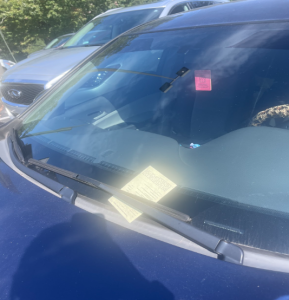Understanding the Severity of the East Palestine Train Derailment
February 17, 2023
On Feb. 3 in East Palestine, Ohio, 38 rail cars derailed, followed by a fire in which an additional 12 cars were damaged, the result of what is suspected to be a faulty axle. Twenty cars were carrying hazardous materials, and of these, 20, 11 derailed.
In order to prevent further catastrophe occurring in the form of an explosion, Ohio Gov. Mike DeWine approved for the 11 derailed train cars to be burned in a “controlled explosion.” The most abundant chemical was vinyl chloride, a substance that, in cases of extended exposure, has been linked to having cancerous effects. Once the burning ensued, citizens of the town within a one-mile radius were ordered to evacuate, given the green light to return only a few days later. Norfolk Southern, the railway transport company responsible for the derailment, promised those affected by ordered evacuation to be compensated with $1,000, despite evacuations extending much further than the required 1-mile radius.
Fallout from the event could be the United States’ worst environmental disaster, with chemicals entering the soil, atmosphere and waterways of the surrounding areas. Sen. J.D. Vance (R-OH), shared a video to Twitter in which it appears that when he drags a stick through the mud of a local creek, chemicals bubble to the surface.
3,500 fish, among 12 species, have been found dead; in addition locals have reported their own animals suffering, suspecting that the chemicals released are the result. Taylor Holzer, a nearby fox owner, has reported that one of his foxes have died, with others exhibiting unusual behavior. Additionally, Andrea Belden was forced with the decision to put her 2-year-old cat down after the pet experienced congestive heart failure; his deteriorated condition was likely being a result of exposure to vinyl chloride.
The EPA (United States Environmental Protection Agency) has been monitoring the progress made while investigating the conditions. Reporting on Feb. 17 that of the 500 homes assisted in air monitoring, “no detections of vinyl chloride or hydrogen chloride above levels of concern” have been made. Additionally, the municipal water has been approved for public consumption, but those with private wells are encouraged to have the water tested. Despite these seemingly reassurances, residents of the area are still hesitant and worried about their future should they continue to reside in East Palestine.
Concerns lie around what conditions allowed the disaster to occur. Footage released by Butech Bliss, shows the train passing through Salem, Ohio, at 8:12 p.m. on Feb. 3. In the footage, it appears that sparks and fire are already evident. Despite this, the train continued to travel an additional 20 miles to reach East Palestine. One preventative measure known as hot box detectors are typically placed every 10 to 20 miles apart and are responsible for alerting crews when parts of the train are at risk of overheating. There are detectors located in both Salem and East Palestine, meaning the detector located in Salem likely failed to alert the crew of the fire.
DeWine has taken issue with the fact that Norfolk Southern was not required to disclose that hazardous chemicals were being transported through the state, nor that they are highly flammable, due to legislation that allows them to be labeled as class two chemicals. The governor of Ohio has pressed Congress to make changes to these conditions.
Most notably, the braking system used by a majority of these trains is technology invented in the Civil War era. An updated braking system known as ECPs (electronically controlled pneumatic brakes) was implemented during the Obama administration, requiring trains transporting highly flammable liquids to implement the braking system by 2021. These rules were subsequently repealed during the Trump administration, citing the cost of implementing the brakes exceeded the cost benefits. Norfolk participated in the lobbying to repeal the rules.
Meanwhile, Secretary of Transportation Pete Buttigieg was criticized for his silence on the situation. Finally breaking his silence on Feb. 13, Buttigieg tweeted, “I continue to be concerned about the impacts of the Feb 3 train derailment near East Palestine, OH, and the effects on families in the 10 days since their lives were upended through no fault of their own.”
The situation has seemingly re-sparked conversation regarding rail safety and the reimplementation of the Obama-era regulations to reinstate ECP brakes. Feb. 17, Buttigieg tweeted USDOT’s plans to hold Norfolk Southern for safety violations that may have contributed to the events.














